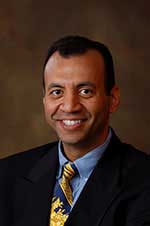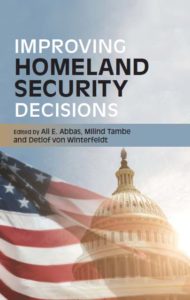
When Congress established the Department of Homeland Security (DHS) in 2002, it ignited a steady blowtorch of issues and outcomes for which DHS leadership, employees, and independent contractors were responsible. As such, it created a need to analyze and manage the torrent of decisions surrounding those issues and outcomes.
Not long after DHS came into being, Ali Abbas, then director of the University of Southern California (USC) Center for Risk and Economic Analysis of Terrorism Events (CREATE), asked co-editors Detlof von Winterfeldt and Milind Tambe to explore with him these many decision-making challenges. The result is the forthcoming Improving Homeland Security Decisions, scheduled for release on Kindle Oct. 31, and in hard cover Dec. 31.
Abbas, who holds a Ph.D. in Management Science and Engineering, is now a professor of Industrial and Systems Engineering and public policy director of the Neely Center for Ethical Leadership and Decision Making at USC. He recently spoke with Homeland411 to talk about the genesis of Improving Homeland Security Decisions and how it was developed to help DHS decision makers.
“The purpose here is to show decision making in the government, that even though there is a decision-making method, it could be flawed, and by using [flawed methods] you could be making wrong decisions,” Abbas said. “The whole theme of the book is improving homeland security decisions and how we can … think of the overall value, which isn’t just cost but involves security, privacy, reliability.”
Abbas came up with the idea while at CREATE when he noticed there had been a lot of government spending on research. “I thought, wouldn’t it be a great idea to … have a lot of people that worked in this area to contribute with their research to make it visible to the population,” he said.
Though they began about 12 years ago, a catalyst for this work was actually the field of operations research, which really took off after World War II. “There was a need for allocating resources from one location to the other, thinking about the costs of doing that, the value,” Abbas said. “During a big war like that, you needed to optimize, and you needed to make good decisions about your resources.”
Abbas said he believes today’s issues are motivating decision-making models in a similar way and thinks the World War II era of development of operations research is analogous to the decisions the country has faced since 9/11.
“I’ve got a chapter in the book, which I really hope a lot of government officials would see, and that is, just because you have a decision-making method doesn’t mean it’s right,” he said referring to the chapter “Flawed Methods of Decision Making.” Abbas recognizes that different components require decision makers to look at different applications, but he’s adamant that they look closely at the methodology used in the analysis as well.
chapter in the book, which I really hope a lot of government officials would see, and that is, just because you have a decision-making method doesn’t mean it’s right,” he said referring to the chapter “Flawed Methods of Decision Making.” Abbas recognizes that different components require decision makers to look at different applications, but he’s adamant that they look closely at the methodology used in the analysis as well.
“One of the big things, of course, is the challenge we have here is we’re dealing [with] large-scale decisions, and also decisions that involve life and death, in addition to money,” Abbas said. “But it’s also decisions that involve the government and government decision making, and also the balance between how you make transparency in the decision-making process versus things that you need to have not so transparent because of security.”
Politics definitely plays a part in the process as well.
“When you look at the number of secretaries or even administrators of the [Transportation Security Administration (TSA)], I don’t recall that anyone has lasted more than two years,” he said. “So we’re dealing also with short-term incentive, whereas if you have a technology that might materialize in five years, do you invest in it, given you know just by the history that it’s very short-term administration?”
Abbas said another focus is the need for trade-offs. “Where is the balance between security, convenience, privacy, reliability, and how you make trade-offs in that regard?” he asked.
To illustrate, he related a story from former Homeland Security Secretary Jeh Johnson when he spoke at USC in 2015: “He said ‘I can make the most secure plane on earth, but no one would want to ride it,’” Abbas said. “You can’t have everyone who goes on a plane wait in a line for 10 hours, strip search them before they go on; that’s going to kill aviation.”
In addition to trade-offs, Abbas said another challenge in government decision making is the difference between a decision and outcome, and it’s illustrated in a recent paper he coauthored with Ken Fletcher, TSA’s chief risk officer.
“We just analyzed the whole benefit to society versus cost to society of including expedited screening,” Abbas said. “We found that it’s a good decision to keep expedited screening, and so that doesn’t mean that if someone abuses the system and gets through, then suddenly it becomes a bad decision to have expedited screening.”
He also added that it behooves a person in government to make sure the decision making is not arbitrary and the process itself is sound.
“It is the responsibility of the analyst to make sure that the process is not flawed, because a flawed process takes away all of the effort that you put in,” Abbas said, noting that sometimes sufficient data isn’t available, and it requires leadership to answer questions in the decision-making process.
Visit Cambridge University Press or amazon.com for ordering information.
© 2017 Homeland411